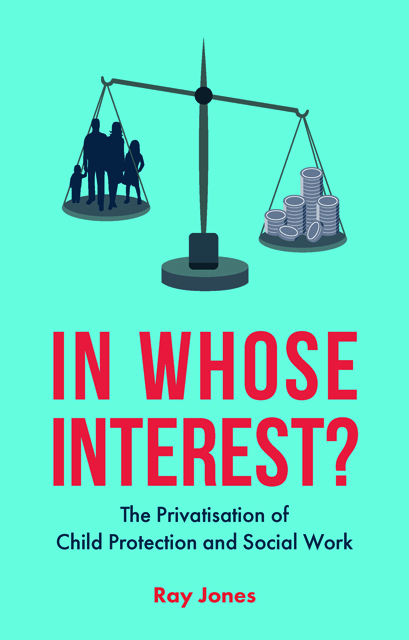four - The formation of the welfare state and its 1980s rejection by Thatcher
Published online by Cambridge University Press: 14 April 2023
Summary
The 2014 Children and Social Work Bill and the thrust towards opening up statutory children’s social work and child protection to the private sector have not emerged in isolation or in a vacuum. They are creatures of their time, and indeed, when compared to the developments and changes elsewhere, might be seen as behind the times.
What is being jettisoned?
The transfer of what were publicly owned assets and public services to a privatised commercial marketplace has been a fundamental change of principle and process. It is now the interests of the owners and shareholders, rather than the interests of the community and of service users, which are legally the first priority for those running privatised public services, including children’s social services, which are now described as an ‘industry’. Wealth trumps well-being and welfare as the legally required first concern of the companies now interested in the marketplace for these services which the government has wanted to create. What a change from the history embedded in much of the past 50 years.
1945–48 and through to the mid-1970s: the welfare state consensus
William Beveridge in his 1942 report provided the argument and the framework for the soon-to-come welfare state with its plans for a comprehensive system of social security and the intention to tackle the ‘five giants’ of want, disease, ignorance, squalor and idleness. As Hennessy noted:
The essence of the Beveridge Report was the abolition of poverty by attacking its multiplicity of causes – illness, unemployment, old age – from a variety of angles with a comprehensive array of instruments. To change metaphors, it turned a patchwork of provision into a quilt.
It was the 1948 National Assistance Act which first and formally noted the demise of the Poor Law. The first sentence of the 1948 Act states that it is ‘an Act to terminate the existing poor law’, a law which Beresford noted was built on principles of discrimination and deterrence. First established in the Elizabethan era in 1601, with subsequent amendments, it had a lifespan of over 350 years before it was substantially replaced by a new moral and policy framework and a new nationwide legislative and service infrastructure.
- Type
- Chapter
- Information
- In Whose Interest?The Privatisation of Child Protection and Social Work, pp. 109 - 116Publisher: Bristol University PressPrint publication year: 2018



